
Malayalam cinema is the segment of Indian cinema dedicated to the production of motion pictures in the Malayalam language, which is widely spoken in the state of Kerala. Malayalam cinema includes the commercial film industry, sometimes known as Mollywood, as well as independent cinema made in Malayalam.

Kattassery Joseph Yesudas is an Indian playback singer and musician who sings Indian classical, devotional and film songs. He is widely considered one of the greatest singers in the history of Indian music and a cultural icon of Kerala. Yesudas is estimated to have recorded more than 50,000 songs in various Indian languages, including Malayalam, Tamil, Kannada, Telugu, Tulu, Hindi, Odia, Bengali, Marathi as well as Arabic, English, Latin, and Russian, in a career spanning six decades. He is often referred to as Gaanagandharvan. Yesudas holds the record for singing 11 songs in different languages in a single day. He has also composed a number of Malayalam film songs during the 1970s and 1980s.
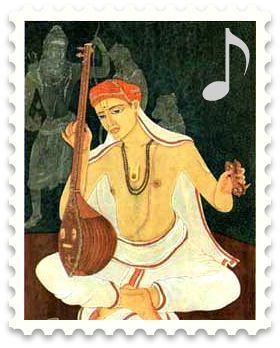
Kerala music has a complex history distinct from Malayalam poetry, with which it is often associated. Though it is often driven by poetry, Kerala also has its roots in Carnatic music. Songs have always been a significant part of early Malayalam literature dating back to the 9th century CE. The significance of music in Kerala's culture can be deduced from the musical poetry that developed in the Malayalam language long before prose. As music evolved in the region, various branches emerged from it
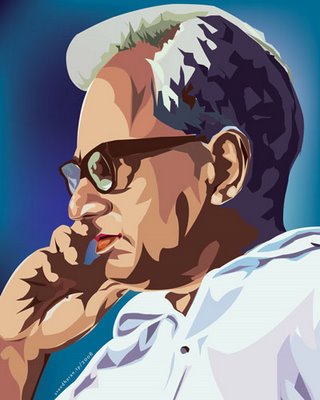
G. Sankara Kurup, also referred to as Mahakavi G, was an Indian poet, essayist and literary critic of Malayalam literature. Known as one of the greats of Malayalam poetry, he was the first recipient of the Jnanpith Award―the highest Indian literary honor. He served as a nominated member of the Rajya Sabha from 1968 to 1972 and received the Padma Bhushan, the third highest Indian civilian award, in 1967. He was also a recipient of Sahitya Akademi Award, Kerala Sahitya Akademi Award and Soviet Land Nehru Award.

Vijaya Nirmala was an Indian actress, director, and producer known for her works predominantly in Telugu cinema along with a few Malayalam and Tamil films. In a career spanning over six decades, she acted in more than 200 films and directed 44 films. In 2002, she entered the Guinness Book of World Records as the female director who has directed the most number of films in the world. In 2008, she received the Raghupathi Venkaiah Award for lifetime achievement in Telugu cinema.

Ottaplakkal Neelakandan Velu Kurup was a Malayalam poet and lyricist from Kerala, India, who won the Jnanpith Award, the highest literary award in India for the year 2007. He received the awards Padma Shri in 1998 and Padma Vibhushan in 2011, the fourth and second highest civilian honours from the Government of India. In 2007 he was awarded an Honorary Doctorate by University of Kerala, Trivandrum. O. N. V. was known for his leftist leaning. He was a leader of All India Students Federation (AISF). He died on 13 February 2016 at KIMS hospital in Thiruvananthapuram due to age-related illnesses, aged 84.

Rekhitha R. Kurup, better known by her stage name Bhamaa, is an Indian former actress who predominantly appeared in Malayalam and Kannada-language films. She made her cinematic debut in 2007 with the Malayalam film Nivedyam, directed by A. K. Lohithadas and had acted in over 41 films.

Venkateswaran Dakshinamoorthy was a veteran carnatic musician and composer and music director of Malayalam, Tamil and Hindi films. His work was predominantly in Malayalam cinema.

K. Raghavan, also fondly called Raghavan Master, was an Indian music composer who predominantly worked in Malayalam cinema and also a carnatic vocalist. Along with G. Devarajan, V. Dakshinamoorthy and Baburaj, Raghavan is often credited for the renaissance of Malayalam film music. He is regarded as the pioneer in contributing Malayalam film songs with its own tunes and styles. Till then, Malayalam film songs were in the tunes of popular Hindi and Tamil film songs and old classical kritis. Raghavan gave a new direction and identity to Malayalam film music. He composed around 400 songs in Malayalam cinema and was active in the Malayalam film industry for nearly four decades. In 1997, he was honoured with the J. C. Daniel Award, Kerala government's highest honour for contributions to Malayalam cinema.

P. K. Raghava Warrier FRCS was an Indian Cardiothoracic surgeon, author and social activist from Kerala.

Ranjith K. Govind, also known as K.G. Ranjith, is an Indian playback singer, working in the Tamil, Telugu, Malayalam and Kannada film industries and has sung more than 2500 songs.
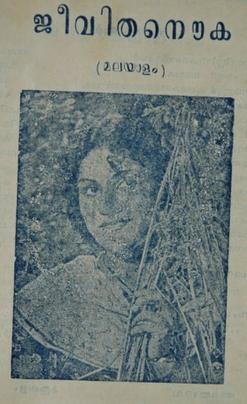
Jeevitha Nouka is a 1951 Malayalam-language film directed by K. Vembu and jointly produced by K. V. Koshi and Kunchako. It was the first "blockbuster cinema" in Malayalam cinema, with a theatrical run of 284 days. Made at a budget of ₹20,000, it was a commercial success at the box office, such that very few cinemas could surpass it later. It was simultaneously shot in Tamil and Telugu, and was dubbed and released in Hindi. This cinema portrayed the life of simple folk in a small village in Kerala. It stars Thikkurissy Sukumaran Nair and B. S. Saroja, with the latter making her debut and the former in his first major role. Its music is composed by V. Dakshinamoorthy and popular playback singer Mehboob debuted through this cinema. It is a remake of the Hindi cinema Jeevan Naiya with revised screenplay.
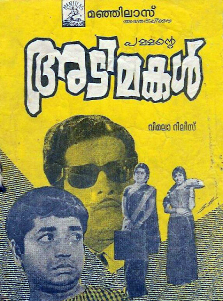
Adimakal (transl. Slaves) is a 1969 Indian Malayalam-language film, directed by K. S. Sethumadhavan and produced by M. O. Joseph. The film stars Sathyan, Prem Nazir, Sheela and Sharada. The film had musical score and songs composed by G. Devarajan. It won the National Film Award for Best Feature Film in Malayalam. The film is based on the novel of the same name by Pamman. The film was remade in Hindi as Intezar (1973) in Telugu as Chilakamma Cheppindi (1977) and in Tamil as Nizhal Nijamagiradhu (1978).
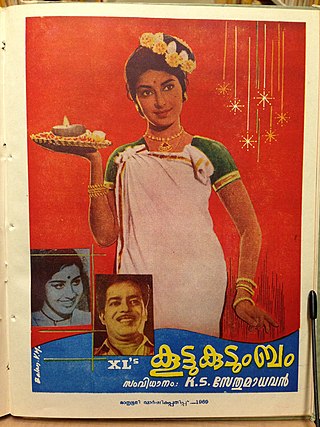
Koottukudumbam is a 1969 Indian Malayalam-language film directed by K. S. Sethumadhavan. The film starsSathyan Prem Nazir,, Sheela and Sharada. It was released on 28 November 1969.

Balyakalasakhi is a 2014 Malayalam language film adaptation of the famous novel of the same name by Vaikom Muhammad Basheer. The romantic musical drama film was written and directed by debutante Pramod Payyannur and stars Mammootty, Isha Talwar, Meena, Seema Biswas, KPAC Lalitha and Mamukkoya in lead roles.
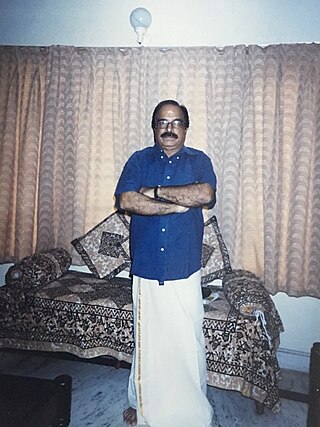
P. Venu, was an Indian film director, producer, screenwriter, and lyricist with over 20 films to his name. His directorial venture Udhyogastha in 1967 was the first-ever multi-star cast film of south India. His work in Malayalam cinema was significant and most influential, covering all themes and genres over a career spanning more than 40 years. His most recognized film C.I.D. Nazir, in 1971, revolutionized movie-making in the investigative genre in Malayalam cinema. Following this film's commercial and critical success, he came up with two more in the series - Taxi Car in 1972 and Prethangalude Thazhvara in 1973, as the first investigative sequels in Malayalam cinema. His last film, Parinamam released in 2003, won an honour for the Malayalam cinema on the global stage by winning the Best Screenplay Award at the Ashdod International Film Festival in Israel. In 2005, he was bestowed the Kala Prathiba by the Kerala Film Critics Association for his contribution to the Malayalam cinema. He was also an active member of MACTA. He published his book titled Udyogastha Muthal in 2010, reminiscing his life as a filmmaker and his experiences in the film industry.
Akashadoothu is 2011 Malayalam language Television drama produced by M.Renjith aired on Surya TV. It is a sequel to 1993 Indian Malayalam-language drama film Akashadoothu directed by Sibi Malayil.The film tells the tale of a widow suffering from leukemia, the series takes off exactly 16 years after we saw the children going their separate ways after the funeral of their mother.
















